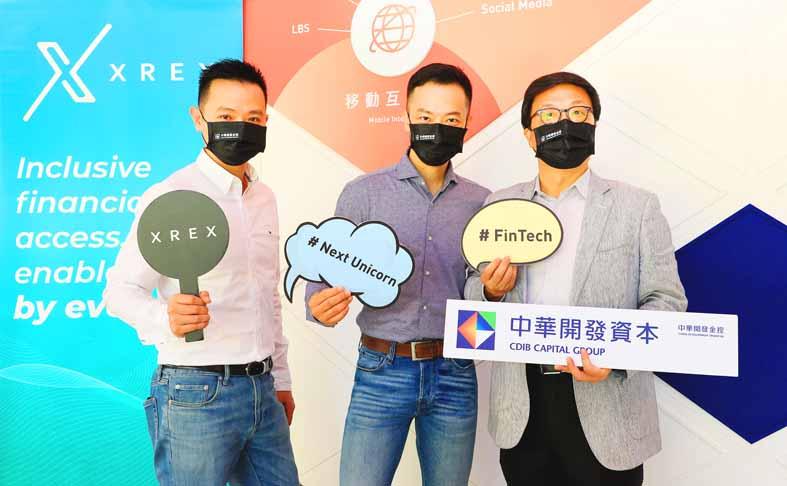XREX Inc (鏈科), which provides blockchain cross-border payment solutions, yesterday said that it is applying for registration in Canada and a license in Singapore to expand its global presence.
The Taipei-based company currently provides payment solutions for companies that do business with India or people who need to remit money to India.
Its service helps customers exchange Indian rupees to digital cryptocurrencies or stable coins such as USDT, at a rate of 1:1 to the US dollar

Photo courtesy of CDIB Capital Innovation Accelerator Fund
XREX has submitted its application for a money service business registration in Canada and for a license to offer cryptoservices in Singapore, and is waiting to have interviews with the regulators, CEO Wayne Huang (黃耀文) told a media briefing in Taipei.
The company applied to offer services such as cross-border payment services, currency swaps and custody, Huang said.
XREX expects its registration application in Canada to be approved in the first quarter of next year and to receive a license in Singapore in the second quarter at the earliest, he said.
Although some companies or cryptotrading platforms have failed to obtain a license or registration in the two markets, XREX is optimistic about its application given its solid practices in information security and anti-money laundering (AML), two issues that concern regulators the most, it said.
The company has implemented know-your customer from the start of its operations and meets the AML rules set by the Financial Action Task Force, chief revenue officer Winston Hsiao (蕭匯宗) said.
XREX is expanding to the two markets as many of its corporate clients have set up branches in Singapore and many of its retail clients are Indians working in Canada.
The company also expects to seek more partners in new markets, Huang said.
“It is our goal to gain all kinds of regulatory permissions in 2022. It is good to see regulators pay attention and implement more regulatory schemes for the crypto industry to make it more solid,” Huang said.
For the local market, XREX is considering including the New Taiwan dollar in its operations next year to serve Taiwanese traders operating in India who have found it difficult to exchange rupees into foreign currencies in the South Asian nation due to highly volatile exchange rates and the high threshold set for foreign-exchange transactions, it said.
XREX is in talks with the Taiwan External Trade Development Council (外貿協會), which has shown an interest in XREX’s solution, it said.
It plans to launch a digital asset program next year called “staking,” a way for cryptocurrency owners to earn rewards by providing their digital assets for use by the platform, or for those who have lots of digital assets, but do not want to cash out yet, he said.
XREX, with paid-in capital of US$24.3 million, expects revenue to continue rising next year due to strong demand.
It in August closed a US$17 million Pre-A round financing, with investors including SBI Investment Co and the National Development Fund (國發基金), it said.

‘SWASTICAR’: Tesla CEO Elon Musk’s close association with Donald Trump has prompted opponents to brand him a ‘Nazi’ and resulted in a dramatic drop in sales Demonstrators descended on Tesla Inc dealerships across the US, and in Europe and Canada on Saturday to protest company chief Elon Musk, who has amassed extraordinary power as a top adviser to US President Donald Trump. Waving signs with messages such as “Musk is stealing our money” and “Reclaim our country,” the protests largely took place peacefully following fiery episodes of vandalism on Tesla vehicles, dealerships and other facilities in recent weeks that US officials have denounced as terrorism. Hundreds rallied on Saturday outside the Tesla dealership in Manhattan. Some blasted Musk, the world’s richest man, while others demanded the shuttering of his

Taiwan’s official purchasing managers’ index (PMI) last month rose 0.2 percentage points to 54.2, in a second consecutive month of expansion, thanks to front-loading demand intended to avoid potential US tariff hikes, the Chung-Hua Institution for Economic Research (CIER, 中華經濟研究院) said yesterday. While short-term demand appeared robust, uncertainties rose due to US President Donald Trump’s unpredictable trade policy, CIER president Lien Hsien-ming (連賢明) told a news conference in Taipei. Taiwan’s economy this year would be characterized by high-level fluctuations and the volatility would be wilder than most expect, Lien said Demand for electronics, particularly semiconductors, continues to benefit from US technology giants’ effort

ADVERSARIES: The new list includes 11 entities in China and one in Taiwan, which is a local branch of Chinese cloud computing firm Inspur Group The US added dozens of entities to a trade blacklist on Tuesday, the US Department of Commerce said, in part to disrupt Beijing’s artificial intelligence (AI) and advanced computing capabilities. The action affects 80 entities from countries including China, the United Arab Emirates and Iran, with the commerce department citing their “activities contrary to US national security and foreign policy.” Those added to the “entity list” are restricted from obtaining US items and technologies without government authorization. “We will not allow adversaries to exploit American technology to bolster their own militaries and threaten American lives,” US Secretary of Commerce Howard Lutnick said. The entities

Minister of Finance Chuang Tsui-yun (莊翠雲) yesterday told lawmakers that she “would not speculate,” but a “response plan” has been prepared in case Taiwan is targeted by US President Donald Trump’s reciprocal tariffs, which are to be announced on Wednesday next week. The Trump administration, including US Secretary of the Treasury Scott Bessent, has said that much of the proposed reciprocal tariffs would focus on the 15 countries that have the highest trade surpluses with the US. Bessent has referred to those countries as the “dirty 15,” but has not named them. Last year, Taiwan’s US$73.9 billion trade surplus with the US